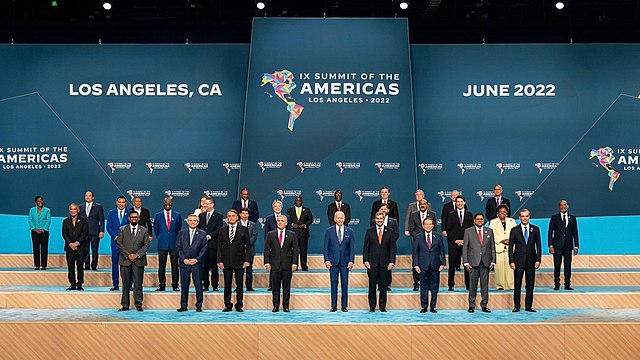|
Biden to Host Inaugural Americas Economic Summit

President Biden joined leaders across the Western Hemisphere in Los Angeles, California to participate in the Ninth Summit of the Americas. This Summit brought governments together to solve pressing challenges and invest in our shared future. - 10 June 2022 (The White House / Facebook)
November 02, 2023 10:15 PM
Anita Powell
washington —
U.S. President Joe Biden will tout his plan to deepen Western Hemisphere economic integration on Friday when he hosts leaders from 11 other nations at the White House for the nascent Americas Partnership for Economic Prosperity.
Analysts say the initiative, introduced last year, may not result in a substantial trade boost or pose a significant challenge to China’s economic dominance and ambitions, but it could address other hemispheric challenges, like irregular migration.
In marketing the initiative on Thursday, Biden emphasized what he sees as a pillar of his diplomatic approach: mutual benefit.
“Together, we're expanding opportunities for working people in both our nations, I believe, including through our Americas Partnership for Economic Prosperity,” Biden said during a pre-summit meeting with Dominican Republic President Luis Abinader.
Treasury Secretary Janet Yellen said Thursday that this economic partnership could affect manufacturing in crucial sectors such as renewables, medical supplies and semiconductors.
She said this is an example of “friendshoring” — the move to diversify supply chains by working with close friends and allies.
Yellen said the economic partnership “offers our countries a key vehicle through which to deepen economic integration, increase the competitiveness of our region, drive private-sector investment and foster inclusive and sustainable development.”
Competition
The United States faces stiff competition. In recent years, China has significantly boosted investment in and economic relations with South America, making it that continent’s largest trading partner.
Because the U.S.-led initiative leans on private-sector investment, it can’t match China’s government-driven approach, said analyst Jason Marczak, senior director at the Atlantic Council’s Adrienne Arsht Latin America Center.
"I don't expect the U.S. to be able to match China dollar for dollar,” he told VOA. “China is not a capitalist system, and so the ways in which Chinese financing goes in the region is state-owned enterprises. It's government money, other sources, all of which are directed by the Chinese government.”
But the U.S. can leverage its leadership by choosing projects and investments wisely and investing “in those areas that are critical for the future economic growth of the people of the Americas, and in a way that hopefully ensures that it is the actual people who ultimately benefit from this investment,” Marczak said.
Like the administration’s still-developing Indo-Pacific Economic Framework, this initiative doesn’t include new market access commitments, said economic analyst Tori Smith of the American Action Forum.
“Market access negotiations could be less necessary in this context, given that the existing network of trade agreements have tariff barriers close to zero with most participants,” she wrote March 2 in an analysis of the partnership. She noted that the U.S. has existing free-trade agreements with eight of the 11 other countries.
The partnership “is unlikely to substantially increase trade flows between the United States and the participating countries because the forum focuses very little on trade policy,” she argued.
However, this still-evolving economic agreement could address other challenges in the hemisphere, Marczak said.
“Investing in the APEC member countries, providing sustainable financing — that is all tied to migration,” he said. “Because ultimately, a country that is sending migrants, there will be less migrants that will leave the country when the economy is even stronger.”
While APEP negotiations lag considerably behind those of the Indo-Pacific Economic Framework - even though the programs were announced at roughly the same time - the U.S. currently has an edge in this hemisphere, said Shannon O'Neil of the Council on Foreign Relations.
“The U.S. maintains an advantage in terms of more comprehensive ground rules, a longer history of investment, and more balanced and higher value-added trade,” she said.
Jorge Agobian contributed to this report.
Copyright © Nov 2023 Voice of America. All Rights Reserved.
Back To Country Profile
|